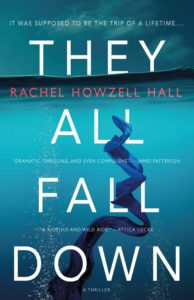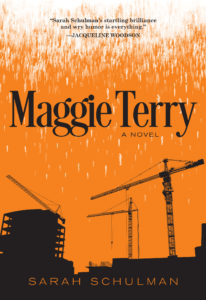When I tell people I co-host a podcast called Unlikeable Female Characters, a common response is this: “I love reading about unlikeable women….I think I might be one.” These are my people—those who embrace complicated women, who know immediately what we mean when we say unlikeable, who wear that label as a badge of honor.
It’s something of an oxymoron, to like the unlikeable. Or is it? When we say “unlikeable,” we really mean a whole list of qualities that the patriarchy finds unpalatable in the female of the species. There’s a list of stereotypically “feminine” qualities (to be clear, I think the idea of a gender binary is bullshit, but this is how society currently defines us), such as: maternal, nice, patient, domestically-minded, emotional, graceful. We’ll call this Column A. Then there are “masculine” qualities: strong, self-confident, muscular, direct, in control. We’ll call this one Column B. Women are nurses and teachers! Men are pilots and engineers! Women are quiet and accommodating, men take charge of a situation! None of these characteristics are good or bad. But when a woman adopts an adjective from Column B, suddenly “in control” becomes “bossy” or “domineering.” “Self-confident” becomes “stuck-up.”
When was the last time you heard a man described as “bossy” or “stuck-up”? Probably never. Our world applies very different standards to women, and this is true in life as well as art.
Unlikeable has become a shorthand way of describing women who contain any combination of characteristics that fall outside of the stereotype of Column A, even though likeability in the sense of capable of being liked, by anyone, ever doesn’t have a thing to do with it. Male characters aren’t often described in terms of their likeability at all.
In our first episode of the podcast, my cohosts Layne Fargo and Wendy Heard and I discussed our favorite and least favorite “unlikeable” characters from pop culture. If liking the unlikeable sounds like an oxymoron, the notion of an unlikeable unlikeable character just seems like a typo. But at the heart of both is the idea of being interesting. I will read (or watch) an interesting character doing anything. It’s when someone stops being interesting that they become truly incapable of being liked to me. We’ve had a ton of smart women writers on the podcast and have even inspired a book club, so there are plenty of sources to fIll up a most unlikeable summer—plus, here’s a roundup of my faves.

They All Fall Down (Rachel Howzell Hall)
This thriller is a smart, modern update to a locked-room mystery like And Then There Were None, and it’s chock full of deliciously unlikeable characters who all converge on a remote island for different reasons. I interviewed Rachel back in March, and we talked about how women of color, in particular, are forced to confront expectations of “being nice” all the time.

Gentleman Jack (HBO / Sally Wainwright)
This HBO series just wrapped up its first season, and I’m already eager for more. It’s based on a real-life historical figure, Anne Lister, who was a property owner, businessperson, more-or-less out lesbian, and all-around difficult lady in early 19th century England. She kept detailed diaries during her life—to the tune of four million words–which is how we know so much about her activities. Suranne Jones’s portrayal of Anne Lister manages to be both hilarious and affecting.

Temper (Layne Fargo)
Yes, Layne is a friend, but her debut hits shelves on July 2–and this is going to be a book that everyone is talking about this summer. Set against the backdrop of Chicago’s indie theater scene, Temper is a psychological thriller with plenty of bisexuality and female ambition thrown in. I can’t tell you how excited I am for people to read this book.

Equity (Meera Menon / Amy Fox)
This 2016 financial thriller stars Anna Gunn as an ambitious investment banker who gets wrapped up in a mess of insider training, hacking, and a social networking platform with privacy concerns. What makes this film remarkable is the finely-crafted characters—women who are allowed to be ambitious and interested in making money.

None of Your Business (Valerie Block)
Don’t let the bathtub on the cover fool you—this is a hilarious heist novel with one of my favorite unlikeable female characters ever. Erica King is a brilliant, embittered accountant who begins to rip off her firm’s clients to fund a secret life. Marvelously witty and biting.

The Best Bad Things (Katrina Carrasco)
A Shamus Award nominee for Best First PI novel, this is a historical mystery featuring a genderqueer investigator in a gritty Washington State port town. Alma is an undercover operative who is credible as a man or as a woman, a useful skill to have in what turns out to be a small world.

Maggie Terry (Sarah Schulman)
This is a character-driven crime novel that focuses on the eponymous character, an ex-cop, recovering addict, and general fuck-up, as she attempts to survive her first week as a private investigator. I picked up Maggie Terry off a bookstore table on a recent vacation and absolutely fell in love with the voice. Schulman writes about addiction and gentrification with a wry compassion, and I’d happily follow Maggie anywhere.

















